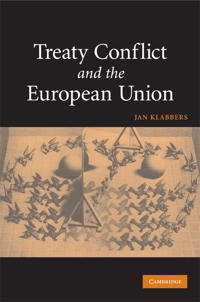The Constitutionalization of International Law (Häftad)
avJan Klabbers, Anne Peters, Geir Ulfstein
ISBN: 9780199693542 - UTGIVEN: 201104The book examines one of the most debated issues in current international law: to what extent the international legal system has constitutional features comparable to what we find in national law. This question has become increasingly relevant in a time of globalization, where new international inst[...]
International Law (Häftad)
avJan Klabbers
ISBN: 9780521144063 - UTGIVEN: 201303Written by one of the world's leading international lawyers, this is a landmark publication in the teaching of international law. International law can be defined as 'the rules governing the legal relationship between nations and states', but in reality it is much more complex, with political, diplo[...]
International Law (Inbunden)
avJan Klabbers
ISBN: 9780521194877 - UTGIVEN: 2013-05-31Clear and concise: a landmark publication in the teaching of international law from one of the world's leading international lawyers.[...]
An Introduction to International Institutional Law (Inbunden)
avJan Klabbers
ISBN: 9780521516204 - UTGIVEN: 2009-05International institutions are powerful players on the world stage, and every student of international law requires a clear understanding of the forces that shape them. For example, with increasing global influence comes the need for internal control and accountability. This thought-provoking overvi[...]
Treaty Conflict and the European Union (Pocket)
avJan Klabbers
ISBN: 9780521728843 - UTGIVEN: 2009-01Jan Klabbers questions how membership of the European Union affects treaties concluded between the Union's member states and third states, both when it concerns treaties concluded before EU membership and treaties concluded after joining. Following a discussion of the public international law rules [...]
An Introduction to International Institutional Law (Pocket)
avJan Klabbers
ISBN: 9780521736169 - UTGIVEN: 200905International institutions are powerful players on the world stage, and every student of international law requires a clear understanding of the forces that shape them. For example, with increasing global influence comes the need for internal control and accountability. This thought-provoking overvi[...]
Research Handbook on the Law of International Organizations (Pocket)
avJan (EDT) Klabbers, Asa Wallendahl, Jan (EDT) Klabbers
ISBN: 9780857931252 - UTGIVEN: 2012-09This pioneering Research Handbook with contributions from renowned experts, provides an overview of the general doctrines making up the law of international organizations. The approach of this book is taken from a novel perspective: that of the tension between functionalism and constitutionalism. I[...]









